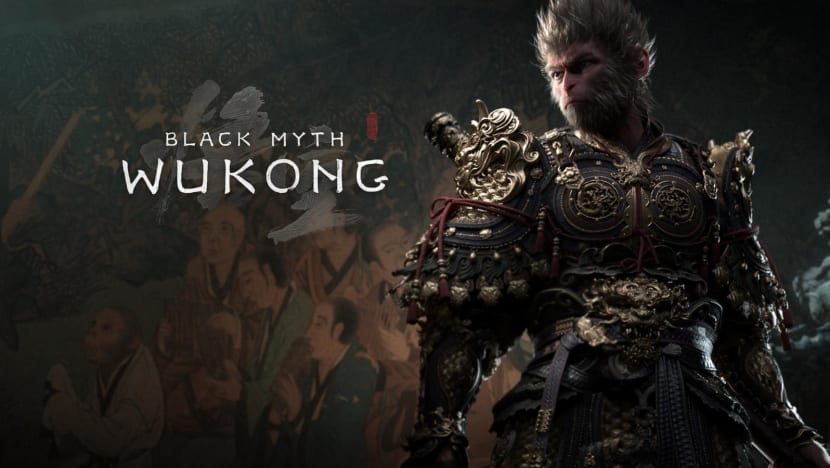Commentary: What does success of Chinese game Black Myth: Wukong signify for the gaming world?
Video games have been an untapped soft power resource in China. The rise of Black Myth: Wukong suggests this is going to change, says this academic.

Black Myth: Wukong, which has been called China’s first AAA game, is generating excitement among Chinese gamers and positive reviews overseas. (File photo: Facebook/epicgames)

This audio is generated by an AI tool.
SUNSHINE COAST, Australia: If asked to name the biggest video game company in the world, you might think of icons such as Nintendo - the famed creator of Mario, Pokemon and The Legend Of Zelda - or maybe PlayStation, the brand associated with mega hits such as Final Fantasy and Uncharted.
But Chinese company Tencent may be on its way to outstripping these competitors, with various market research companies listing it as one of the top three video game producers worldwide by revenue.
Currently, one game made by Tencent-backed start-up Game Science is topping the charts on Steam, the world’s largest digital PC gaming store.
Released on Tuesday (Aug 20), Black Myth: Wukong has already achieved a concurrent player count of more than 2.2 million players. And that’s before counting the gamers buying and playing it on PlayStation 5 consoles or computers.
The action role-playing game is also China’s first AAA game (an industry term for “blockbuster” releases). Even more remarkably, its developer Game Science doesn’t have experience crafting blockbusters and has mostly focused on mobile games.
Back in 2020, Game Science’s very first trailer for Black Myth: Wukong was reportedly aimed at attracting new employees rather than players. Developing a premium console game has been considered commercially risky in China’s gaming market, which is saturated with free-to-play mobile and online games.
So why take the risk?
BIG RISK, BIG REWARD
According to press reports, Black Myth: Wukong was a passion project intended to bring a classic Chinese tale to video gamers.
The game is inspired by a 16th-century (Ming Dynasty) novel called Journey To The West, attributed to Wu Cheng’en. Players control an anthropomorphic monkey who gathers relics to revive a legendary hero, against a backdrop brimming with ancient heritage and culture.
But the risk also made good commercial sense. China’s restrictions on video games - which include limiting children to one hour of gaming on Fridays, Saturdays and Sundays and none during the rest of the week - have made global headlines. They have also resulted in Chinese developers looking to overseas markets to survive and grow.
This includes Tencent. Only about 30 per cent of Tencent’s massive revenue comes from markets outside China. What better way to boost this than with a fantasy epic resembling Western hit series such as Baldur’s Gate and The Witcher?
And there was already some precedent for this strategy. Another Chinese story-focused fantasy game, Genshin Impact (first released in 2020) was a financial hit. This game used a Japanese anime-inspired design to appeal to Western players, earning about US$3.6 billion in two years - with 42 per cent of this coming from Japanese and US players alone.
EXERTING INFLUENCE
But money isn’t the only reason Chinese game developers might want to focus on high-quality story-driven games. After all, mobile games can still be profitable; the Swedish mobile game Candy Crush has made more than US$20 billion since its release in 2012.
However, it’s hard for games like Candy Crush - which lack deep stories and characters - to really leave a mark on players. In other words, they don’t provide a “soft power” advantage.
Soft power refers to the ability to influence others subtly via ideas and values. China has engaged in this process for decades through sports, infrastructure, educational exchanges and even through leasing pandas to other countries.
Until now, video games have been an untapped soft power resource in China. But the rise of Black Myth: Wukong suggests this is going to change.
Game Science heavily researched the story and heritage presented in Black Myth: Wukong, as game developers often do. They visited locations in the Shanxi Province that appear in the game to enhance authenticity, a trait that is highly desired by players.
To capitalise, the Shanxi culture and tourism authority released its own promotional material to tie in with Black Myth: Wukong, highlighting the real-life locations that inspired the game.
THE ROAD AHEAD
Although the Chinese video game industry was underdeveloped when iconic consoles such as Nintendo 64 and the original PlayStation were released, games such as Black Myth: Wukong and Genshin Impact show it is rapidly catching up.
Yet plenty of challenges remain, the first of which is the Chinese government’s existing and proposed gaming restrictions.
Game Science also faces accusations of sexism, along with other companies in the Chinese tech and gaming industry, and the Western industry.
Beyond this, the increasing cost of living means gamers don’t have the discretionary funds they once had. Investors are pulling back and thousands of industry workers have been laid off.
In these uncertain times, Chinese developers seem to be hurtling forward. From another Chinese company, Everstone Studio’s upcoming release Where Winds Meet is another historical, story-focused game with blockbuster aspirations. More such games aimed at Western players will mean more competition for Western developers.
There’s a famed saying that “China is a sleeping lion” (or giant, or dragon, depending on which version you hear). It’s often attributed to Napoleon Bonaparte, although experts think he probably never said it.
But China’s leader Xi Jinping did say it, back in 2014, when he described the nation as a “peaceful lion”. It won’t be long before gamers everywhere hear its roar.
Jacqueline Burgess is Lecturer in International Business at the University of the Sunshine Coast. This commentary first appeared on The Conversation.















